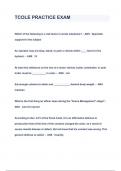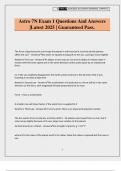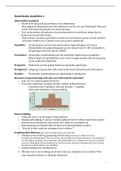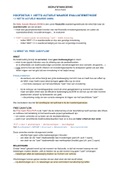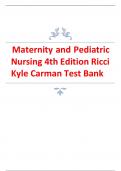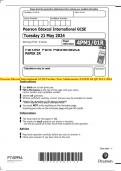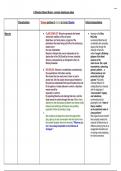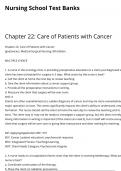Theories of International Business
Lecture week 1 – Core Foundations of IB & MNEs
Multinational Enterprises
An MNE: ‘a firm that owns and/or controls value creating activities in two or more
different countries’ (Adaptation of Buckley & Casson, 2009, p.1564) multiple
locations
An MNE is a firm that uses FDI to establish or purchase income-generating assets
abroad, but may also trade goods and services across international borders
Foreign Direct Investment
FDI: an investment made to acquire lasting interest in enterprises operating outside
of the economy of the investors
Investors’ purpose is to gain an effective voice in the management of the enterprise
% of equity ownership considered an effective voice in the management of an
enterprise (degree of control)
Transaction Cost Economics
Coasian Transaction Cost Economics (TCE)
o Originally within a domestic context
Explains whether the market or a firm will coordinate economic activity
o Most efficient coordination mechanism between market & vertical integration
when market imperfections in place
Market imperfections generate transaction costs (TCs)
Search and information costs
Bargaining costs (i.e. incomplete contracts)
Policing and enforcement costs
Internalization allows coordination when a transaction in the intermediate market
would not have taken place due to too high (TCs)
What are transaction costs?
Scanning the environment and finding an adequate trading partner, Negotiating and
bargaining, writing up a contract, Controlling and monitoring performance, Enforcing the
contract, e.g. going to court & Facing the risks associated with “hold-up”
,Internalization Theory
Imperfect intermediate product markets
o Incentives to bypass imperfect intermediate product markets by creating
internal markets
o Interdependent activities are brought under common ownership and control
Why do MNEs exist?
o They are capable to use internal transactions (within the firm) when market
transactions across borders are not feasible due to high TCs
MNEs aim at maximizing profit by internalizing their intermediate
market across borders in order to avoid market imperfections
General Theory of the MNE
Emphasis on the ability of MNEs to create and control their FSAs
o Possessing FSAs is a necessary but not a sufficient condition for FDI to take
place
MNEs FSAs should not be dissipated, rather protected
o MNEs internal market, i.e. network of foreign subsidiaries, enables to
monitor, transfer and exploit FSAs abroad
(also where national institutional regimes may be not effective)
Why do MNEs invest abroad? (more in week 3)
Traditional investment motives: market seeking, efficiency seeking, (natural)
resource seeking
Modern investment motives: strategic asset seeking (catch-up, diversification, R&D
springboard)
Scandinavian: Uppsala Model (Johanson & Vahine, 1977)
Try to explain the internalization of small Scandinavian firms
The Uppsala model suggests that there are stages of internationalization
o Internationalization as a cumulative and path-dependent process based on
past international experience and knowledge base
“Experiential market knowledge”
o Firm with no (or few) international experience enter foreign markets
By exporting,
Establishing a sales subsidiary
Investing in production facilities
The importance of “Psychic distance”
o Degree to which a firm is uncertain of the host country’s characteristics
Psychic distance Costs and risks of FDI
Benefits of exploiting FSAs abroad Risks of operating in unknown foreign
environments
o Firms initially expand in nearby geographic countries that are relative familiar
(i.e. geographically, institutionally and culturally proximate)
o After accumulating experience, MNEs expands into more distant country
markets
,MNE as a Network
MNE is viewed as a network rather than a monolithic hierarchy
o The subsidiary becomes the key building block of the MNE and unit of analysis
Viewpoint: understanding each subsidiary’s idiosyncratic resource base, strategy,
assigned role inside the MNE, and linkages with other subsidiaries
o Emphasis on organizational entrepreneurship or ‘subsidiary initiative’, rather
than the parent company
Rugman and Verbeke (1992, 2001, 2003)
o Location-bound (LB) vs, non-location-bound (NLB) FSAs
LB FSAs – deployed only in a limited geographical area result of
subsidiary’s initiative
NLB FSAs – easily transferred across locations result of MNE
network effort
RBV & MNEs
Firms performance is related to their sustainable competitive advantage at firm-level,
which is
o The result of superiority in resources recombination vis-à-vis competitors
… In the MNE case
o An added complexity in resources recombination
Rivalry for resources could come also from the internal network of
subsidiaries
Importance of subsidiary’s mandate
RBV & VRIN/VRIO Models
Tangible and intangible resources/assets
o Tangibility possible to observe or quantify (measure/count)
o Intangibility not observable and difficult (if not impossible) to quantify
Capabilities
o Competences owned by the firm as a result of combining resources (and
capabilities) together to perform a specific task (core competences)
RBV & IB: Trend topics
International strategic alliances
o RBV learn from partners may be a tacit resource underlying a firm’s
competitive advantage
o IB for MNEs, earning from local partners facilitate local knowledge
acquisition and strengthen firm performance in host countries
Emerging market MNEs (EMNEs)
o Emerging markets represent a unique institutional environment EMNEs are
different vis-à-vis traditional MNEs (e.g. State-owned enterprises, Business
groups, Born global)
It answers the questions such as: why some firms do not go through the stage-model
of internationalization?
, Institutional-based view of IB
Defining institutions & IBV
Institutions are commonly known as the ‘rules of the game’ defined:
o By economist North (1990) as ‘the humanly devised constraints that structure
human interaction’
o By sociologist Scott (1995) as ‘regulative, normative, and cognitive structures
and activities that provide stability and meaning to social behavior’
Institutions shape individual and firm behavior
o Bounded rational choices, reliability in interactions with other actors
o ‘.. institutions reduce uncertainty for different actors by conditioning the
ruling norms of behaviors and defining the boundaries of what is legitimate.
Actors […] make choices within a given institutional framework’
Institutional Framework: North’s definition
North: institutions are humanly devised constraints that structure political, economic
& social interaction
o Create order
o Reduce uncertainty of exchange
Formal rules: constitutions, laws property rights
Informal constraints: sanctions, taboos, customs, traditions)
Incremental institutional evolution of political and economic institutions create the
economic environment
North’s Contrasting Institutions
What explains differences?
Nature of context: higher levels of political competition
Path dependency:
o Organizations owe their existence to the opportunities provided by the
(in)formal institutional frameworks
o Differing opportunities sets lead to different historical paths
Institutions can be WEAK OR STRONG
“Institutional weakness” means incentive structures are absent, arbitrary or
ambiguous
This translates into unpredictability and thus risk
Depends in part on whether society is rule-based or relationship-based:
o In rule-based settings, institutions are more transparent and predictable (to
outsiders) than in relationship-based settings
Institutions can be WEAK
Proceedings held behind closed doors
Exact definition of ‘state’ or ‘trade’ secret unknown
Defendants ‘typically found guilty’
Main lesson for other MNEs?
“You never know what is going to happen”
WEAK definitions
o Corruption and bribery
Lecture week 1 – Core Foundations of IB & MNEs
Multinational Enterprises
An MNE: ‘a firm that owns and/or controls value creating activities in two or more
different countries’ (Adaptation of Buckley & Casson, 2009, p.1564) multiple
locations
An MNE is a firm that uses FDI to establish or purchase income-generating assets
abroad, but may also trade goods and services across international borders
Foreign Direct Investment
FDI: an investment made to acquire lasting interest in enterprises operating outside
of the economy of the investors
Investors’ purpose is to gain an effective voice in the management of the enterprise
% of equity ownership considered an effective voice in the management of an
enterprise (degree of control)
Transaction Cost Economics
Coasian Transaction Cost Economics (TCE)
o Originally within a domestic context
Explains whether the market or a firm will coordinate economic activity
o Most efficient coordination mechanism between market & vertical integration
when market imperfections in place
Market imperfections generate transaction costs (TCs)
Search and information costs
Bargaining costs (i.e. incomplete contracts)
Policing and enforcement costs
Internalization allows coordination when a transaction in the intermediate market
would not have taken place due to too high (TCs)
What are transaction costs?
Scanning the environment and finding an adequate trading partner, Negotiating and
bargaining, writing up a contract, Controlling and monitoring performance, Enforcing the
contract, e.g. going to court & Facing the risks associated with “hold-up”
,Internalization Theory
Imperfect intermediate product markets
o Incentives to bypass imperfect intermediate product markets by creating
internal markets
o Interdependent activities are brought under common ownership and control
Why do MNEs exist?
o They are capable to use internal transactions (within the firm) when market
transactions across borders are not feasible due to high TCs
MNEs aim at maximizing profit by internalizing their intermediate
market across borders in order to avoid market imperfections
General Theory of the MNE
Emphasis on the ability of MNEs to create and control their FSAs
o Possessing FSAs is a necessary but not a sufficient condition for FDI to take
place
MNEs FSAs should not be dissipated, rather protected
o MNEs internal market, i.e. network of foreign subsidiaries, enables to
monitor, transfer and exploit FSAs abroad
(also where national institutional regimes may be not effective)
Why do MNEs invest abroad? (more in week 3)
Traditional investment motives: market seeking, efficiency seeking, (natural)
resource seeking
Modern investment motives: strategic asset seeking (catch-up, diversification, R&D
springboard)
Scandinavian: Uppsala Model (Johanson & Vahine, 1977)
Try to explain the internalization of small Scandinavian firms
The Uppsala model suggests that there are stages of internationalization
o Internationalization as a cumulative and path-dependent process based on
past international experience and knowledge base
“Experiential market knowledge”
o Firm with no (or few) international experience enter foreign markets
By exporting,
Establishing a sales subsidiary
Investing in production facilities
The importance of “Psychic distance”
o Degree to which a firm is uncertain of the host country’s characteristics
Psychic distance Costs and risks of FDI
Benefits of exploiting FSAs abroad Risks of operating in unknown foreign
environments
o Firms initially expand in nearby geographic countries that are relative familiar
(i.e. geographically, institutionally and culturally proximate)
o After accumulating experience, MNEs expands into more distant country
markets
,MNE as a Network
MNE is viewed as a network rather than a monolithic hierarchy
o The subsidiary becomes the key building block of the MNE and unit of analysis
Viewpoint: understanding each subsidiary’s idiosyncratic resource base, strategy,
assigned role inside the MNE, and linkages with other subsidiaries
o Emphasis on organizational entrepreneurship or ‘subsidiary initiative’, rather
than the parent company
Rugman and Verbeke (1992, 2001, 2003)
o Location-bound (LB) vs, non-location-bound (NLB) FSAs
LB FSAs – deployed only in a limited geographical area result of
subsidiary’s initiative
NLB FSAs – easily transferred across locations result of MNE
network effort
RBV & MNEs
Firms performance is related to their sustainable competitive advantage at firm-level,
which is
o The result of superiority in resources recombination vis-à-vis competitors
… In the MNE case
o An added complexity in resources recombination
Rivalry for resources could come also from the internal network of
subsidiaries
Importance of subsidiary’s mandate
RBV & VRIN/VRIO Models
Tangible and intangible resources/assets
o Tangibility possible to observe or quantify (measure/count)
o Intangibility not observable and difficult (if not impossible) to quantify
Capabilities
o Competences owned by the firm as a result of combining resources (and
capabilities) together to perform a specific task (core competences)
RBV & IB: Trend topics
International strategic alliances
o RBV learn from partners may be a tacit resource underlying a firm’s
competitive advantage
o IB for MNEs, earning from local partners facilitate local knowledge
acquisition and strengthen firm performance in host countries
Emerging market MNEs (EMNEs)
o Emerging markets represent a unique institutional environment EMNEs are
different vis-à-vis traditional MNEs (e.g. State-owned enterprises, Business
groups, Born global)
It answers the questions such as: why some firms do not go through the stage-model
of internationalization?
, Institutional-based view of IB
Defining institutions & IBV
Institutions are commonly known as the ‘rules of the game’ defined:
o By economist North (1990) as ‘the humanly devised constraints that structure
human interaction’
o By sociologist Scott (1995) as ‘regulative, normative, and cognitive structures
and activities that provide stability and meaning to social behavior’
Institutions shape individual and firm behavior
o Bounded rational choices, reliability in interactions with other actors
o ‘.. institutions reduce uncertainty for different actors by conditioning the
ruling norms of behaviors and defining the boundaries of what is legitimate.
Actors […] make choices within a given institutional framework’
Institutional Framework: North’s definition
North: institutions are humanly devised constraints that structure political, economic
& social interaction
o Create order
o Reduce uncertainty of exchange
Formal rules: constitutions, laws property rights
Informal constraints: sanctions, taboos, customs, traditions)
Incremental institutional evolution of political and economic institutions create the
economic environment
North’s Contrasting Institutions
What explains differences?
Nature of context: higher levels of political competition
Path dependency:
o Organizations owe their existence to the opportunities provided by the
(in)formal institutional frameworks
o Differing opportunities sets lead to different historical paths
Institutions can be WEAK OR STRONG
“Institutional weakness” means incentive structures are absent, arbitrary or
ambiguous
This translates into unpredictability and thus risk
Depends in part on whether society is rule-based or relationship-based:
o In rule-based settings, institutions are more transparent and predictable (to
outsiders) than in relationship-based settings
Institutions can be WEAK
Proceedings held behind closed doors
Exact definition of ‘state’ or ‘trade’ secret unknown
Defendants ‘typically found guilty’
Main lesson for other MNEs?
“You never know what is going to happen”
WEAK definitions
o Corruption and bribery


